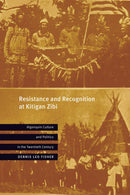Description
Dennis Leo Fisher is an assistant professor of Indigenous studies at Bemidji State University, Minnesota. He is a descendant of Algonquin and Nipissing Anishinàbeg from Quebec. He was taught by his late mentor, Stan Dumont Whiteduck, and by Elders at Kitigan Zibi, the largest and oldest Algonquin reserve in Canada. His publications have appeared in the Journal of South Texas and the American Indian Quarterly.
Resistance and Recognition at Kitigan Zibi tells the modern history of Kitigan Zibi, the largest and oldest Algonquin reserve in Canada. This local history sheds light on the larger experience of the Algonquin First Nations whose traditional lands span the Ottawa River watershed and cross contemporary boundaries.
Drawing on archival sources and interviews with community members, this work elucidates the relationship between culture and politics on the reserve during the twentieth century. Despite the disruptions of settler colonialism, the Algonquin have maintained a distinct identity and have waged a multifaceted struggle against assimilation and economic marginalization. This struggle has played out in political spaces including border-crossing celebrations, grand councils, and courtrooms. This fight has also informed strategic labour choices, interactions with game wardens, and protests against the Catholic Church.
Resistance and Recognition at Kitigan Zibi demonstrates that the contest over recognition of treaty rights and traditional lands is longer, broader, and deeper than previously understood. This book contains 16 Black & White photos.
Resistance and Recognition at Kitigan Zibi tells the modern history of Kitigan Zibi, the largest and oldest Algonquin reserve in Canada. This local history sheds light on the larger experience of the Algonquin First Nations whose traditional lands span the Ottawa River watershed and cross contemporary boundaries.
Drawing on archival sources and interviews with community members, this work elucidates the relationship between culture and politics on the reserve during the twentieth century. Despite the disruptions of settler colonialism, the Algonquin have maintained a distinct identity and have waged a multifaceted struggle against assimilation and economic marginalization. This struggle has played out in political spaces including border-crossing celebrations, grand councils, and courtrooms. This fight has also informed strategic labour choices, interactions with game wardens, and protests against the Catholic Church.
Resistance and Recognition at Kitigan Zibi demonstrates that the contest over recognition of treaty rights and traditional lands is longer, broader, and deeper than previously understood. This book contains 16 Black & White photos.


